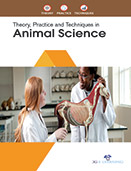Animal and Veterinary Science

Animal science is concerned with the study of animals that live alongside humans. Around the globe, humans depend on animals for companionship, food, fiber, and work. Animals play important roles in all our lives, and children especially seem to have a natural affinity for animals. The nature of their relationships with animals and the natural world are important in shaping their overall attitudes and beliefs. Encouraging positive relationships with other living beings and our common home—the Earth—is the aim of Humane Education. The enormous diversity of work done by animals ranges from transportation to hunting to assisting the blind. Even in the automotive era, “horsepower” endures as a unit of measurement. Egyptian illustrations from 5,000 years ago show oxen pulling plows, and cattle have historically been used more than horses as draft animals. Animals like horses and donkeys are used as a means of transportation and for recreation activities like racing. Service dogs offer their senses of sight, hearing and smell to aid people with disabilities and perform law-enforcement duties. Animals can be of great importance in the human life.
This book titled “Theory, Practice and Techniques in Animal Science” provides an introductory overview on such key topics as animal production, rearing and products, and focuses on disciplines such as nutrition, reproduction, genetics and diseases. The text is concerned in aspects of both strategic and applied science in the areas of animal breeding and genetics, nutrition, physiology and functional biology of systems, behavior, health and welfare, livestock farming systems and environment, and product quality, human health and well-being. Emphasis is placed on managed animals and on the integrative nature of biological systems. The comprehensive text with non-traditional approach introduces the discipline as an ever-changing, integral part of every aspect of human existence. This book is intended to prepare students majoring in animal science for more advanced and specialized courses.